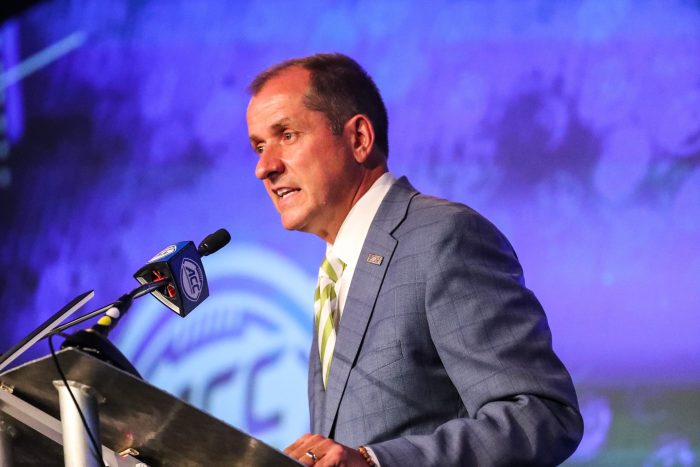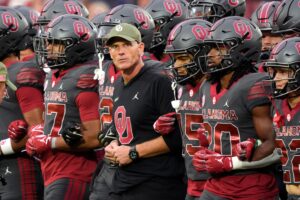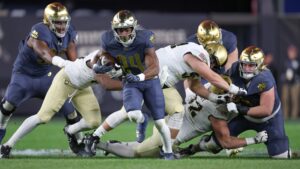In today’s ever changing college sports world, there is very little that stays the same from one season to the next. Last year, Oklahoma and Texas stunned the Big XII by announcing they were leaving for the SEC. Just a few weeks ago, UCLA and USC delivered a seismic quake to college sports. The two schools from the #2 media market in the country announced they were leaving the Pac-12 for the Big 10. That has left many to ponder what happens next to the Pac-12, Big XII, and the ACC. As far as the latter is concerned, the ACC has a lot of questions.
Commissioner Jim Phillips took the lead at ACC Kickoff, the conference’s official media days in Charlotte. Phillips met with the media on Wednesday and addressed a lot of the uncertainty in the college sports landscape.
The ACC Has A Lot Of Questions
ACC schools are currently bound by a Grant of Rights for their television rights that lasts another 14 years. It made sense to lock in ESPN as a long-term partner when the deal was signed in 2013, and revised in 2016. But it is now seen by some conference affiliates as suffocating. The media landscape has evolved and revolved at least another six to seven times since the deal was signed off on by each school.
Phillips acknowledged that the ever-growing TV deals for the Big 10 and SEC could mean the ACC gets lapped financially. He walked a fine line between acknowledging there was a need to keep all options open and insisting that the GoR is a rock solid commitment. “We’re looking at our TV contract. We’re in engagement daily — almost daily with our partners at ESPN. I openly talk about ESPN because we are 50/50 partners on our network, and so they’re motivated, we’re motivated,” Phillips said. “We’ve come together to have some discussions about what would be the next iteration for the ACC. It doesn’t mean we’re going to make a move. It doesn’t mean we’re not going to make a move, but all options are on the table.”
The Rich Getting Richer, With Or Without The ACC
Phillips carried a theme of “neighborhoods” through out his media availability. He repeatedly said “all neighborhoods need to be healthy.” It was a way of expressing that there was not going to be a rush to adjust to the ever changing landscape. Yet, he was walking the fine line again between the neighborhoods health and the need to be financially competitive for the ACC’s member institutions. The SEC and Big 10 schools are in line to make upwards of $15-$20 million more per school per year than ACC schools.
“All neighborhoods need to be healthy. It’s not good for college athletics if we’re not, and, again, you heard my reference earlier. We understand where those two leagues are. No one is ignoring that. We’re all trying to find ways to close that gap,” Phillips said.
But there is that Grant of Rights, which he maintains is foundationally important in securing the conference membership as is. “I love our 15 schools, and I’m confident in us staying together. That’s all I’ve heard in all the calls that we’ve had. We want to work together to try to provide more resources to our student-athletes, so we’re all on the same page,” Phillips said.
The Notre Dame Question
The subject of the potential for Notre Dame to jump in as a football member of the conference is a routine question for the conference head. The Irish played an ACC schedule in the 2020 Covid year. Because they are an independent, they would have had no football season when everyone else in the country went to a truncated conference-only schedule. The Irish still compete in an ACC-affiliated fashion in other sports and their logo was present on the ACC list of schools at media days.
But adding Notre Dame would require a vote of the current ACC membership. While it would likely pass, Last Word has been advised by administrators at two schools, that the path is not that clean. Speaking on condition of anonymity because they were not authorized to address the issue publicly, the two administrators each said they had the same expectations. If the conference wants to add Notre Dame, the “yes” votes would be there but with conditions. Their schools would want to revisit the terms of the Grant of Rights.
All Exits Are Not The Same
Because the term of the Grant of Rights still has so many years, a buyout from any school could reach the $100 million level. Phillips said other schools that are leaving their conferences are staying long enough for their contract to expire instead of paying the buyout. He specifically brought up USC, UCLA, Oklahoma, and Texas.
But during the Q&A, Last Word reminded Phillips that those four schools only had two to three years left on the contracts. We asked if he was suggesting that ACC schools would also stay, even though the remaining term was 14 years. “Everything is on the table. We understand what that means. We understand what that revenue means moving forward, but I will also say, as I look at the next few years, I like where we’re going. But, again, the window is through ’36, so we’re going to have to address it, no question,” Phillips said. “Your point is a good one. Your point is a good one.”
The NIL Dilemma
Phillips also addressed national topics like NIL, joining a growing chorus of administrators asking for help in getting to a national guidance on what schools, and athletes, can and can’t do.
“The lack of a single enforceable standard for NIL across the schools and all states has created an environment where inducements inaccurately labeled as NIL are disrupting recruiting,” Phillips said. “We all know NIL has upended recruiting, a result no one desired when it came into effect last July. How did it happen? NIL rules differ from state to state. Regulation is nonexistent. Enforcement of the rules is incredibly challenging.
With the lack of enforcement from the NCAA, Phillips said the next best solution for a national plan sits with the federal government. “As state legislators continue to seek recruiting advantages and as legal challenges continue to chill the enforcement of rules, only Congress can provide consistent standards and the appropriate protection to implement what is ultimately passed.”
It goes back to Phillips talking about all neighborhoods needing to be healthy. He said he did not want what he referred to as two or three parts living in gated communities, closing everyone else out. “Fundamentally we are all responsible for the greater good of the enterprise,” he said. “We are not the professional ranks. This is not the NFL or NBA Light. We all remain competitive with one another, but this is not and should not be a winner-take-all or a zero-sum structure.”
Main Image courtesy Jaylynn Nash, LLC/ACC






